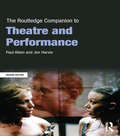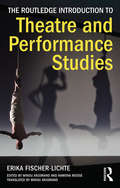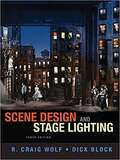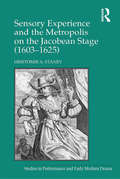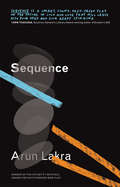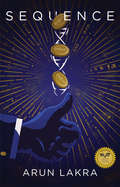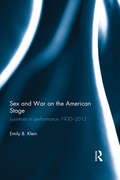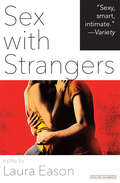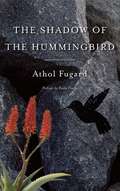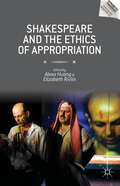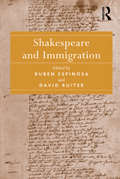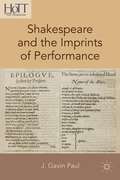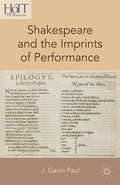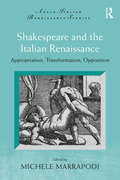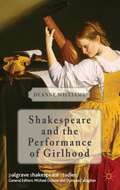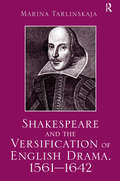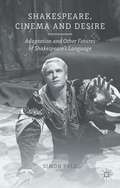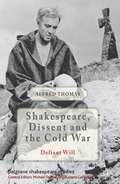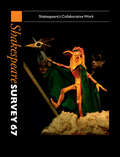- Table View
- List View
The Routledge Companion to Theatre and Performance (Routledge Companions)
by Paul Allain Jen HarvieWhat is theatre? What is performance? What connects them and how are they different? What events, people, practices and ideas have shaped theatre and performance in the twentieth and twenty-first century? The Routledge Companion to Theatre and Performance offers some answers to these big questions. It provides an analytical, informative and engaging introduction to important people, companies, events, concepts and practices that have defined the complementary fields of theatre and performance studies. This fully updated second edition contains three easy to use alphabetized sections including over 120 revised entries on topics and people ranging from performance artist Ron Athey, to directors Vsevold Meyerhold and Robert Wilson, megamusicals , postdramatic theatre and documentation. Each entry includes crucial historical and contextual information, extensive cross-referencing, detailed analysis and an annotated bibliography. The Routledge Companion to Theatre and Performance is a perfect reference guide for the keen student.
The Routledge Introduction to Theatre and Performance Studies
by Erika Fischer-Lichte Minou Arjomand Ramona MosseErika Fischer-Lichte's introduction to the discipline of Theatre and Performance Studies is a strikingly authoritative and wide ranging guide to the study of theatre in all of its forms. Its three-part structure moves from the first steps in starting to think about performance, through to the diverse and interrelated concerns required of higher-level study: Part 1 - Central Concepts for Theatre and Performance Research - introduces the language and key ideas that are used to discuss and think about theatre: concepts of performance; the emergence of meaning; and the theatrical event as an experience shared by actors and spectators. Part 1 contextualizes these concepts by tracing the history of Theatre and Performance Studies as a discipline. Part 2 - Fields, Theories and Methods - looks at how to analyse a performance and how to conduct theatre-historiographical research. This section is concerned with the 'doing' of Theatre and Performance Studies: establishing and understanding different methodological approaches; using sources effectively; and building theoretical frameworks. Part 3 - Pushing Boundaries - expands on the lessons of Parts 1 and 2 in order to engage with theatre and performance in a global context. Part 3 introduces the concept of 'interweaving performance cultures'; explores the interrelation of theatre with the other arts; and develops a transformative aesthetics of performance. Case studies throughout the book root its theoretical discussion in theatrical practice. Focused accounts of plays, practitioners and performances map the development of Theatre and Performance Studies as an academic discipline, and of the theatre itself as an art form. This is the most comprehensive and sophisticated introduction to the field available, written by one of its foremost scholars.
Scene Design And Stage Lighting
by R. Craig Wolf Dick BlockNow in full color and packed with professional information and cutting-edge technologies, SCENE DESIGN AND STAGE LIGHTING, Tenth Edition, equips you with the most up-to-date coverage available on scenery, lighting, sound, and technology. Completely current, the exciting new tenth edition has two new chapters on digital integration in scene design and lighting design (Chapters 12 and 13), a new chapter on getting work in the profession (Chapter 28), and mirrors the best of real-world practices. Vibrant color production photographs support the text and spotlight examples of contemporary work. The book retains its strong emphasis on modern technology, with many changes in the lighting design and sound design chapters, reflecting the latest practices. The text also includes an expanded section on television design, as well as an emphasis on health and safety issues. The authors emphasize collaboration in all sections of the text, and they provide insight via interviews with professional lighting and scenery designers in two features: "Working Professionals" and "Designers at Work." Reflecting current professional practice, SCENE DESIGN AND STAGE LIGHTING, Tenth Edition, offers in-depth coverage of a broad range of topics, making it the most detailed and comprehensive text available in the scenic, lighting, and sound design fields.
Sensory Experience and the Metropolis on the Jacobean Stage (Studies In Performance And Early Modern Drama Ser.)
by Hristomir A. StanevAt the turn of the seventeenth century, Hristomir Stanev argues, ideas about the senses became part of a dramatic and literary tradition in England, concerned with the impact of metropolitan culture. Drawing upon an archive of early modern dramatic and prose writings, and on recent interdisciplinary studies of sensory perception, Stanev here investigates representations of the five senses in Jacobean plays in relationship to metropolitan environments. He traces the significance of under-examined concerns about urban life that emerge in micro-histories of performance and engage the (in)voluntary and sometimes pre-rational participation of the five senses. With a dominant focus on sensation, he argues further for drama’s particular place in expanding the field of social perception around otherwise less tractable urban phenomena, such as suburban formation, environmental and noise pollution, epidemic disease, and the impact of built-in city space. The study focuses on ideas about the senses on stage but also, to the extent possible, explores surviving accounts of the sensory nature of playhouses. The chapters progress from the lower order of the senses (taste and smell) to the higher (hearing and vision) before considering the anomalous sense of touch in Platonic terms. The plays considered include five city comedies, a romance, and two historical tragedies; playwrights whose work is covered include Shakespeare, Jonson, Webster, Fletcher, Dekker, and Middleton. Ultimately, Stanev highlights the instrumental role of sensory flux and instability in recognizing the uneasy manner in which the London writers, and perhaps many of their contemporaries, approached the rapidly evolving metropolitan environment during the reign of King James I.
Sequence
by Arun LakraTheo has been named Time Magazine's Luckiest Man Alive. For twenty consecutive years he has successfully bet double or nothing on the Super Bowl coin toss. And he's getting ready to risk millions on the twenty-first when he is confronted by Cynthia, a young woman who claims to have figured out his mathematical secret. Stem-cell researcher and professor Dr. Guzman is on the verge of a groundbreaking discovery. She's also learned that one of her students has defied probability to get all 150 multiple-choice questions wrong on his genetics exam, but it's not until he shows up to her office in the middle of the night that she's able to determine if it's simply bad luck. The two narratives intertwine like a fragment of DNA to examine the interplay between logic and metaphysics, science and faith, luck and probability. Belief systems clash, ideas mutate, and order springs from chaos. With razor-sharp wit and playful language, Sequence asks, in our lives, in our universe, and even in our stories, does order matter?
Sequence (Second Edition)
by Arun Lakra“Luck is like irony. Not everybody who thinks they got it, got it.” Theo has been named Time Magazine’s Luckiest Man Alive. For twenty consecutive years he has successfully bet double or nothing on the Super Bowl coin toss. And he’s getting ready to risk millions on the twenty-first when he is confronted by Cynthia, a young woman who claims to have figured out his mathematical secret. Stem-cell researcher and professor Dr. Guzman is on the verge of a groundbreaking discovery. She’s also learned that one of her students has defied probability to get all 150 multiple-choice questions wrong on his genetics exam, but it’s not until he shows up to her office in the middle of the night that she’s able to determine if it’s simply bad luck. The two narratives intertwine like a double helix of DNA to examine the interplay between logic and metaphysics, science and faith, luck and probability. Belief systems clash, ideas mutate, and order springs from chaos. With razor-sharp wit and playful language, Sequence asks, in our lives, in our universe, and even in our stories, does order matter?
Sex and War on the American Stage: Lysistrata in performance 1930-2012
by Emily KleinAmerican adaptations of Aristophanes’ enduring comedy Lysistrata have used laughter to critique sex, war, and feminism for nearly a century. Unlike almost any other play circulating in contemporary theatres, Lysistrata has outlived its classical origins in 411 BCE and continues to shock and delight audiences to this day. The play’s "make love not war" message and bawdy humor render it endlessly appealing to college campuses, activist groups, and community theatres – so much so that none of Aristophanes’ plays are performed in the West as frequently as Lysistrata. Starting with the play’s first mainstream production in the U.S. in 1930, Emily B. Klein explores the varied iterations of Lysistrata that have graced the American stage, page, and screen since the Great Depression. These include the Federal Theatre’s 1936 Negro Repertory production, the 1955 movie musical The Second Greatest Sex and Spiderwoman Theater’s openly political Lysistrata Numbah!, as well as Douglas Carter Beane’s Broadway musical, Lysistrata Jones, and the international Lysistrata Project protests, which updated the classic in the contemporary context of the Iraq War. Although Aristophanes’ oeuvre has been the subject of much classical scholarship, Lysistrata has received little attention from feminist theatre scholars or performance theorists. In response, this book maps current debates over Lysistrata’s dubious feminist underpinnings and uses performance theory, cultural studies, and gender studies to investigate how new adaptations reveal the socio-political climates of their origins. Emily B. Klein is Assistant Professor of English and Drama at Saint Mary's College of California. Her work has appeared in Women and Performance and Frontiers as well as Political and Protest Theater After 9/11: Patriotic Dissent (Routledge, 2012).
Sex with Strangers
by Laura EasonHow far will you go to get what you want? Will you be the same person if you finally do? When star sex blogger and memoirist Ethan, 24, tracks down his idol, the gifted but obscure 40ish novelist Olivia, he finds they each crave what the other possesses. As attraction turns to sex, and they inch closer to getting what they want, both must confront the dark side of ambition and the near impossibility of reinventing oneself when the past is only a click away. Sex with Strangers had its world premiere at Steppenwolf Theatre Company; it will have its New York premiere at Second Stage Theatre in June 2014, directed by David Schwimmer.
Sex with Strangers
by Laura EasonHow far will you go to get what you want? Will you be the same person if you finally do? When star sex blogger and memoirist Ethan, 24, tracks down his idol, the gifted but obscure 40ish novelist Olivia, he finds they each crave what the other possesses. As attraction turns to sex, and they inch closer to getting what they want, both must confront the dark side of ambition and the near impossibility of reinventing oneself when the past is only a click away. Sex with Strangers had its world premiere at Steppenwolf Theatre Company; it will have its New York premiere at Second Stage Theatre in June 2014, directed by David Schwimmer.
The Shadow of the Hummingbird
by Athol Fugard Paula Fourie"The greatest active playwright in the English-speaking world."--Time"If there is a more urgent and indispensable playwright in world theater than South Africa's Athol Fugard, I don't know who it could be."--Newsweek"Athol Fugard can say more with a single line than most playwrights convey in an entire script."--VarietyLegendary theatre artist Athol Fugard returns to the stage for the first time in fifteen years in this, his latest work. The Shadow of the Hummingbird tells the story of an ailing man in his eighties and the afternoon spent with his ten year-old grandson. In a charming meditation on the beauty and transience of the world around us, Fugard continues to mine the depths of the human spirit with profound empathy and heart. The text of the play includes an introductory Prelude by Paula Fourie with extracts from Fugard's unpublished notebooks.Athol Fugard has been working in the theater as a playwright, director, and actor for more than fifty years. In 2011, he received a Special Tony Award for Lifetime Achievement in the Theatre, and he was the inaugural Humanitas Visiting Professor of Drama at Oxford University. His plays include Blood Knot, Boesman and Lena, Statements After an Arrest Under the Immorality Act, Sizwe Banzi Is Dead, 'Master Harold' . . . and the Boys, The Road to Mecca, My Children! My Africa! and The Blue Iris.
Shakespeare And The Ethics Of Appropriation
by Alexa Huang Elizabeth RivlinMaking an important new contribution to rapidly expanding fields of study surrounding the adaptation and appropriation of Shakespeare, Shakespeare and the Ethics of Appropriation is the first book to address the intersection of ethics, aesthetics, authority, and authenticity.
Shakespeare and Immigration
by Ruben EspinosaShakespeare and Immigration critically examines the vital role of immigrants and aliens in Shakespeare's drama and culture. On the one hand, the essays in this collection interrogate how the massive influx of immigrants during the reign of Queen Elizabeth I influenced perceptions of English identity and gave rise to anxieties about homeland security in early modern England. On the other, they shed light on how our current concerns surrounding immigration shape our perception of the role of the alien in Shakespeare's work and expand the texts in new and relevant directions for a contemporary audience. The essays consider the immigrant experience; strangers and strangeness; values of hospitality in relationship to the foreigner; the idea of a host society; religious refuge and refugees; legal views of inclusion and exclusion; structures of xenophobia; and early modern homeland security. In doing so, this volume offers a variety of perspectives on the immigrant experience in Shakespearean drama and how the influential nature of the foreigner affects perceptions of community and identity; and, collection questions what is at stake in staging the anxieties and opportunities associated with foreigners. Ultimately, Shakespeare and Immigration offers the first sustained study of the significance of the immigrant and alien experience to our understanding of Shakespeare's work. By presenting a compilation of views that address Shakespeare's attention to the role of the foreigner, the volume constitutes a timely and relevant addition to studies of race, ethics, and identity in Shakespeare.
Shakespeare and Renaissance Ethics
by Patrick Gray John D. CoxWritten by a distinguished international team of contributors, this volume explores Shakespeare's vivid depictions of moral deliberation and individual choice in light of Renaissance debates about ethics. Examining the intellectual context of Shakespeare's plays, the essays illuminate Shakespeare's engagement with the most pressing moral questions of his time, considering the competing claims of politics, Christian ethics and classical moral philosophy, as well as new perspectives on controversial topics such as conscience, prayer, revenge and suicide. Looking at Shakespeare's responses to emerging schools of thought such as Calvinism and Epicureanism, and assessing comparisons between Shakespeare and his French contemporary Montaigne, the collection addresses questions such as: when does laughter become cruel? How does style reflect moral perspective? Does shame lead to self-awareness? This book is of great interest to scholars and students of Shakespeare studies, Renaissance studies and the history of ethics.
Shakespeare and the Digital World
by Christie Carson Peter KirwanDue to the unique cultural capital of his works, Shakespeare has long been the test subject for new methods and digital advances in arts scholarship. Shakespeare sits at the forefront of the digital humanities – in archiving, teaching, performance and editing – impacting on scholars, theatres and professional organisations alike. The pace at which new technologies have developed is unprecedented (and the pressure to keep up is only growing). This book offers seventeen new essays that assess the opportunities and pitfalls presented by the twenty-first century for the ongoing exploration of Shakespeare. Through contributions from a broad range of scholars and practitioners, including case studies from those working in the field, the collection engages with the impact of the digital revolution on Shakespeare studies. By assessing and mediating this sometimes controversial digital technology, the book is relevant to those interested in the digital humanities as well as to Shakespeare scholars and enthusiasts.
Shakespeare and the Embodied Heroine
by Lori LeighShakespeare and the Embodied Heroine is a dynamic cross-period investigation of Shakespeare's notable female characters from the late plays. Using the Restoration and eighteenth century adaptations of Shakespeare's plays, this book explores female characters from a theatrical point-of-view that includes a close-reading and imagining of the text with a 'directorial eye', performance history, and practical staging experiments. Leigh reveals evidence to question certain conventional interpretations of Shakespeare's heroines and also documents a paradoxical reduction of sexuality and independent agency for Shakespeare's female roles as they started to be played by actresses rather than boy players. Highlighting the manner in which Shakespeare's female characters have the power to question, subvert, and reposition gender boundaries, and illuminating the complexity and multiplicity of the ways the women in Shakespeare's plays express their agency and desire, this book provides fascinating new readings on the staging and reception of Shakespeare's heroines.
Shakespeare and the Imprints of Performance (History Of Text Technologies)
by J. Gavin PaulShakespeare and the Imprints of Performance.
Shakespeare and the Imprints of Performance (History of Text Technologies)
by J. Gavin PaulWithin the study of drama, the question of how to relate text and performance—and what interpretive tools are best suited to analyzing them—is a longstanding and contentious one. Most scholars agree that reading a printed play is a means of dramatic realization absolutely unlike live performance, but everything else beyond this premise is contestable: how much authority to assign to playwrights, the extent to which texts and readings determine performance, and the capability of printed plays to communicate the possibilities of performance. Without denying that printed plays distort and fragment performance practice, this book negotiates an intractable debate by shifting attention to the ways in which these inevitable distortions can nevertheless enrich a reader's awareness of a play's performance potentialities. As author J. Gavin Paul demonstrates, printed plays can be more meaningfully engaged with actual performance than is typically assumed, via specific editorial principles and strategies. Focusing on the long history of Shakespearean editing, he develops the concept of the performancescape: a textual representation of performance potential that gives relative shape and stability to what is dynamic and multifarious.
Shakespeare and the Italian Renaissance: Appropriation, Transformation, Opposition (Anglo-Italian Renaissance Studies)
by Michele MarrapodiShakespeare and the Italian Renaissance investigates the works of Shakespeare and his fellow dramatists from within the context of the European Renaissance and, more specifically, from within the context of Italian cultural, dramatic, and literary traditions, with reference to the impact and influence of classical, coeval, and contemporary culture. In contrast to previous studies, the critical perspectives pursued in this volume’s tripartite organization take into account a wider European intertextual dimension and, above all, an ideological interpretation of the 'aesthetics' or 'politics' of intertextuality. Contributors perceive the presence of the Italian world in early modern England not as a traditional treasure trove of influence and imitation, but as a potential cultural force, consonant with complex processes of appropriation, transformation, and ideological opposition through a continuous dialectical interchange of compliance and subversion.
Shakespeare and the Performance of Girlhood
by Deanne WilliamsThis is the first scholarly study devoted to Shakespeare's girl characters and conceptions of girlhood. It charts the development of Shakespeare's treatment of the girl as a dramatic and literary figure, and explores the impact of Shakespeare's girl characters on the history of early modern girls as performers, patrons, and authors.
Shakespeare and the Versification of English Drama, 1561-1642
by Marina TarlinskajaSurveying the development and varieties of blank verse in the English playhouses, this book is a natural history of iambic pentameter in English. The main aim of the book is to analyze the evolution of Renaissance dramatic poetry. Shakespeare is the central figure of the research, but his predecessors, contemporaries and followers are also important: Shakespeare, the author argues, can be fully understood and appreciated only against the background of the whole period. Tarlinskaja surveys English plays by Elizabethan, Jacobean and Caroline playwrights, from Norton and Sackville’s Gorboduc to Sirley’s The Cardinal. Her analysis takes in such topics as what poets treated as a syllable in the 16th-17th century metrical verse, the particulars of stressing in iambic pentameter texts, word boundary and syntactic segmentation of verse lines, their morphological and syntactic composition, syllabic, accentual and syntactic features of line endings, and the way Elizabethan poets learned to use verse form to enhance meaning. She uses statistics to explore the attribution of questionable Elizabethan and Jacobean plays, and to examine several still-enigmatic texts and collaborations. Among these are the poem A Lover's Complaint, the anonymous tragedy Arden of Faversham, the challenging Sir Thomas More, the later Jacobean comedy The Spanish Gypsy, as well as a number of Shakespeare’s co-authored plays. Her analysis of versification offers new ways to think about the dating of plays, attribution of anonymous texts, and how collaborators divided their task in co-authored dramas.
Shakespeare, Cinema and Desire
by Simon RyleShakespeare, Cinema and Desire explores the desires and the futures of Shakespeare's language and cinematographic adaptations of Shakespeare. Tracing ways that film offers us a rich new understanding of Shakespeare, Simon Ryle highlights issues that are central to both Shakespeare and film: media technologies, narrative territories and flows, mourning and loss, the voice, the body, sexuality and gender. The recirculation of Shakespearean ideas in the critical theory of modernity, especially figures such as Jacques Lacan, Maurice Blanchot, Jacques Derrida, and Gilles Deleuze, parallels the negotiations of film adaptation. By focusing on the dialogue between Shakespeare and modernity, this study explores how Shakespeare film adaptation raises broad questions concerning the emancipatory potential of aesthetics. Shakespeare is the source of more movie screenplays than any other writer in history, and negotiations between Shakespeare and developing cinematic technologies have been influential across the history of cinema. This book contributes a much needed analysis of the relation of Shakespeare's language to film form, providing in-depth studies of major Shakespeare adaptations from directors such as Akira Kurosawa, Peter Greenaway, Joseph Mankiewicz, Grigori Kozintsev, Svend Gade, Jean-Luc Godard, and Laurence Olivier.
Shakespeare, Dissent, and the Cold War
by Alfred ThomasShakespeare, Dissent and the Cold War is the first book to read Shakespeare's drama through the lens of Cold War politics. The book uses the Cold War experience of dissenting artists in theatre and film to highlight the coded religio-political subtexts in Hamlet, King Lear, Macbeth and The Winter's Tale.
Shakespeare in Quebec
by Jennifer DrouinIn Shakespeare in Québec, Jennifer Drouin analyses representations of nation and gender in Shakespearean adaptations written in Québec since the Quiet Revolution. Using postcolonial and gender theory, Drouin traces the evolution of discourses of nation and gender in Québec from the Conquest of New France to the present, and she elaborates a theory of adaptation specific to Shakespeare studies.Drouin's book explains why Québécois playwrights seem so obsessed with rewriting "le grand Will," what changes they make to the Shakespearean text, and how the differences between Shakespeare and the adaptations engage the nationalist, feminist, and queer concerns of Québec society.Close readings from ten plays investigate the radical changes to content that allowed Québécois playwrights to advocate for political change and contribute to the hot debates of the Quiet Revolution, the 1970 October Crisis, the 1980 and 1995 referenda, the rise of feminism, and the emergence of AIDS. Drouin reveals not only how Shakespeare has been adapted in Québec but also how Québécois adaptations have evolved in response to changes in the political climate. As a critical analysis in English of rich but largely ignored French plays, Shakespeare in Québec bridges Canada's "two solitudes."
Shakespeare Survey: Volume 67, Shakespeare's Collaborative Work
by Peter Holland Ton HoenselaarsShakespeare Survey is a yearbook of Shakespeare studies and production. Since 1948 Survey has published the best international scholarship in English and many of its essays have become classics of Shakespeare criticism. Each volume is devoted to a theme, or play, or group of plays; each also contains a section of reviews of the previous year's textual and critical studies and of major British performances. The books are illustrated with a variety of Shakespearean images and production photographs. The current editor of Survey is Peter Holland. The first eighteen volumes were edited by Allardyce Nicoll, numbers 19-33 by Kenneth Muir and numbers 34-52 by Stanley Wells. The virtues of accessible scholarship and a keen interest in performance, from Shakespeare's time to our own, have characterized the journal from the start. For the first time, numbers 1-50 are being reissued in paperback, available separately and as a set.<P> The theme for Volume 67 is 'Shakespeare's Collaborative Work'. The complete set of Survey volumes is also available online at http://www.cambridge.org/online/shakespearesurvey. This fully searchable resource enables users to browse by author, essay and volume, search by play, theme and topic, and save and bookmark their results.
The Shakespearean Archive
by Alan GaleyWhy is Shakespeare so often associated with information technologies and with the idea of archiving itself? Alan Galey explores this question through the entwined histories of Shakespearean texts and archival technologies over the past four centuries. In chapters dealing with the archive, the book, photography, sound, information, and data, Galey analyzes how Shakespeare became prototypical material for publishing experiments, and new media projects, as well as for theories of archiving and computing. Analyzing examples of the Shakespearean archive from the seventeenth century to today, he takes an original approach to Shakespeare and new media that will be of interest to scholars of the digital humanities, Shakespeare studies, archives, and media history. Rejecting the idea that current forms of computing are the result of technical forces beyond the scope of humanist inquiry, this book instead offers a critical prehistory of digitization read through the afterlives of Shakespeare's texts.
